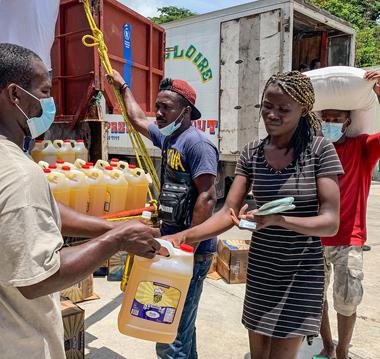Things You Need To Know
Four things you should know about food systems

Billions of people, from farmers to supermarket cashiers, to those who monitor food safety or install irrigation technologies contribute to the world’s food systems. This web of connected people and processes is at the heart of food security and nutrition for the world’s growing population. As the global community prepares for the Food Systems Summit this month, here are four things you should know about the world’s food systems:
1. Food systems are an entry point for achieving all 17 SDGs
The 2019 Global Sustainable Development Report identified food systems as one of six entry points where the SDGs are deeply connected and where coordinated actions can have cascading positive impacts across Goals and Targets. For example, by harnessing synergies and addressing trade-offs, actions on food systems can advance climate action and gender equality, reduce hunger and poverty, create jobs and generate economic growth.
2. We are not on track to deliver on the food-related SDGs
Looking ahead, food systems will need to deliver nutritious food for a global population of 9 to 10 billion people with greatly reduced environmental impacts. The challenge is great. Even before the COVID-19 pandemic, hunger was on the rise after years of decline (as many as 811 million people were hungry in 2020) and obesity is also rising globally.
3. Doing more of the same will not feed the world, and may wreck our planet
Existing practices throughout food systems are associated with biodiversity loss, deforestation and land degradation (which can contribute to the spread of disease); and agriculture is associated with 70 per cent of freshwater use and 29 per cent of greenhouse gas emissions.
4. Partnerships, science and technology can transform food systems
Coordinated and cohesive approaches to transformation are needed that join-up business, government, science, individuals, and community cutting across silos. Science and technology also have a vast potential to address trade-offs in food systems, but there is a need for more knowledge sharing, increased access to technologies, and capacity building. Some resources are already in place to facilitate such exchanges including the UN Technology Facilitation Mechanism and the online platform for technology and knowledge sharing – 2030 Connect.
The Food Systems Summit is an opportunity to mobilize resources and formulate innovative and cross-cutting actions drawing on the best available knowledge and dialogues at all levels and among all stakeholders.
 Welcome to the United Nations
Welcome to the United Nations